According to a story from MLT News, September is Ovarian Cancer Awareness Month. 15-year survivor of ovarian cancer Deborah Binder shared her experience with the disease to help contribute to awareness. It all started in 2009 when she was 50 years old and was getting an annual checkup with her primary care physician.
She told the doctor that she believed she was beginning menopause due to irregular and heavy periods. Deborah was also experiencing some unexpected weight gain. While these signs were not enough for her physician to immediately suspect ovarian cancer, these are some of the early, non-specific symptoms that individuals need to learn about. A vaginal ultrasound revealed that Deborah’s ovaries were enlarged to nearly the size of grapefruits. A gynecologist recommended a complete hysterectomy and believed that Deborah had ovarian cysts.
It was only during the surgery that the surgeons discovered high grade stage IIc ovarian cancer. Three weeks later, she was on a six month chemotherapy regimen that was comprised of paclitaxel and carboplatin. The treatment was a grueling experience for Deborah:
“It was hard on my body — I became anemic, had to have blood transfusions and experienced a level of fatigue that I never knew existed.”
Deborah sought genetic counseling during treatment and a genetic test revealed that she tested positive for a mutation of the BRCA1 gene, which is widely associated with a greatly increased risk of ovarian and breast cancers. She also had a family history of cancer, and following the test, she underwent a mastectomy to prevent the onset of breast cancer.
That was back in 2010, and today, Deborah is making the most of her survival by advocating for ovarian cancer research and treatment in a variety of ways. Deborah also made a video about the importance of genetic testing that you can find here.
Deborah advises all concerned to learn and share the B.E.A.C.H. symptoms:
B= Bloating
E= Early satiety (feeling full quickly)
A= Abdominal pain
C= Changes in bowel or bladder function
H= Heightened fatigue
About Ovarian Cancer
Ovarian cancer can appear on or within the ovary. Ovarian cancer rarely causes distinctive symptoms in its early stages, so many patients are often diagnosed with advanced disease. The risk of getting ovarian cancer is connected to how long a woman has ovulated during her life; women who ovulate for longer periods are at greater risk. Late menopause or early puberty are risk factors, as are not having children, fertility medication, certain genetic variants and mutations (such as BRCA mutations), and exposure to talc, herbicides, and pesticides. Some symptoms of ovarian cancer include fatigue, bloating, a feeling of fullness, loss of appetite, indigestion, abdominal swelling, and pelvic pain. Treatment can include chemo, radiation, surgery, hormone therapy, and immunotherapy. There are many different kinds of ovarian cancer. Five-year survival rate is 45% in the US. To learn more about ovarian cancer, click here.
Editor’s Note: Get Involved
Cancer doesn’t discriminate. WHATNEXT and its partners are interested in amplifying the voices of those from all identities and backgrounds. If you have a cancer journey to share, reach out here to learn more about how your voice can help spread awareness and inspire individuals from all walks of life.
cancer awareness community spotlight ovarian cancer
Last modified: September 24, 2024











